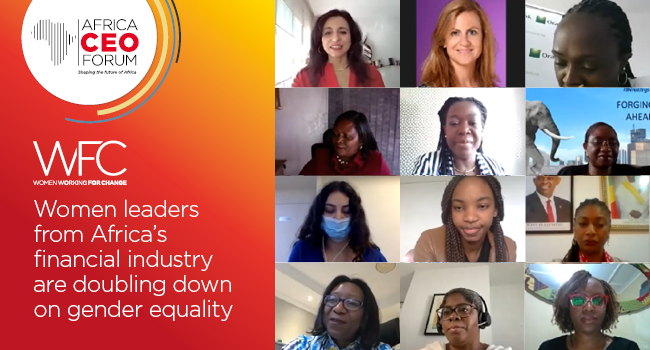Women leaders from Africa’s financial industry are doubling down on gender equality
29 April 2021

The Africa Financial Industry Summit (AFIS), held virtually on 10 and 11 March 2021, brought together a cohort of women leaders from Africa’s financial industry in a private session. At this first inspiring meeting, participants put forward a number of solutions aimed at closing the gender gap.
At the Africa Financial Industry Summit, which took place on 10 and 11 March 2021, a workshop for women leaders from the financial sector provided a forum for an hour and a half of spirited, enthralling discussion between participants, ending with a promise to meet again shortly to continue the exercise in some form. Led by Lamia Merzouki, Deputy General Manager at the Casablanca Finance City Authority, Co-Chair of the International Network of Financial Centres for Sustainability (FC4S) and Co-Leader of the Women Working for Change Network, a cohort of more than 15 female finance executives came together to discuss how to advance women’s careers in Africa’s financial sector. From creating a CV bank to establishing a pan-African investment fund focused on advancing women’s careers in the sector, many proposals were put on the table with a view to removing barriers to achieving greater gender equality in the finance world. These issues have never been more relevant than today, as the global public health crisis has tended to exacerbate disparities between men and women in the labour market, both in Africa and elsewhere.
Bringing down barriers to women’s leadership
From the outset of the discussion, participants agreed that the finance world has a gender gap problem and that, if nothing changes, it could persist: “Men are disproportionately overrepresented in senior- and junior-level positions,” said Martine Valcin, Global Manager, Corporate Governance at the International Finance Corporation (IFC). All participants pointed out how difficult it is to achieve greater representation in Africa’s financial sector even though more than 54% of the continent’s population is female. Diversity is lacking early on in careers, making it harder for women to reach executive positions. One main barrier decried by several female professionals in the sector is the absence of concrete policies to address improving women’s representation or, when such policies do exist, the resources and will to actually implement them are not there. As Patience Akyianu, Group CEO of Hollard Insurance Ghana, put it: “We said we wanted to bring more women into our company, but the reality is that no punitive measures are imposed if we fall short of the 30% target for female board members.” Some firms are, however, prepared to dangle financial incentives to encourage a more diverse workforce. Aida Diarra, Senior Vice President and Sub-Saharan Africa Group Country Manager at Visa, explained: “In South Africa, we are required to meet a 50% gender diversity target each year. If I don’t reach it, I don’t get my bonus.”
From networking to funding, the public health crisis has undermined solutions to women’s empowerment
Participants unanimously agreed that building networks which take into account all aspects of a career, from getting training to reaching the top of the pyramid, is essential to address the critical need to improve women’s representation at every level of the organisational chart.
To crystallise these networks, initiatives such as women’s networking sessions at events like the Africa CEO Forum and the Africa Financial Industry Summit are popular: “Networks are very important because when it comes to empowering women, being able to exchange expertise is crucial. That’s what we started to do during this workshop and that’s what helps us excel,” said Josiane Tchoungui, Managing Director at Orabank Benin.
Creating mentorship programmes to identify and cultivate talent is another initiative that could be undertaken. In the same vein, every professional in attendance voiced their support for an African women-only CV bank. This idea would help increase the pool of female applicants for leadership positions. “I think that creating a CV bank we can use between us is an excellent idea. We should create more opportunities for one another. This is a vital, pressing issue that we need to work on immediately,” said Odyle Cardoso, an executive member of the board of directors at the Angolan financial institution Banco Millennium Atlantico.
But to make these initiatives a reality, they have to be envisioned from a pan-African perspective and the necessary funding for their implementation secured. Haoua Cissé, Executive Director of Corporate Banking at UBA Mali, underscored this point: “It would be a good idea to create a continent-wide investment fund and to use microfinance to help African women in need of credit.”
This funding gap has become an increasingly urgent issue, as the Covid crisis has exacerbated inequality by disproportionately impacting women: “Women are overrepresented in the hardest-hit business sectors, like tourism, hospitality and informal trade,” said Milkah Wachiuri, Chief Growth Officer at Cellulant. The executive also called on Africa’s financial institutions to act and to go as far as setting up a special structure focused on “providing a mutual aid fund to help women-owned businesses get back on their feet”.

